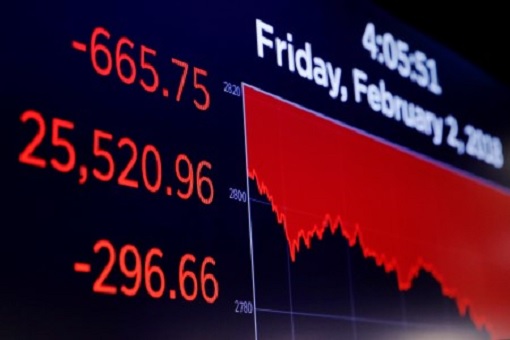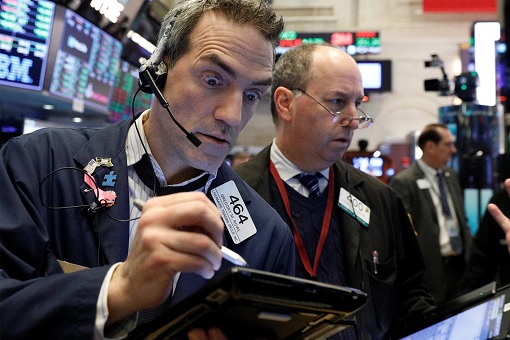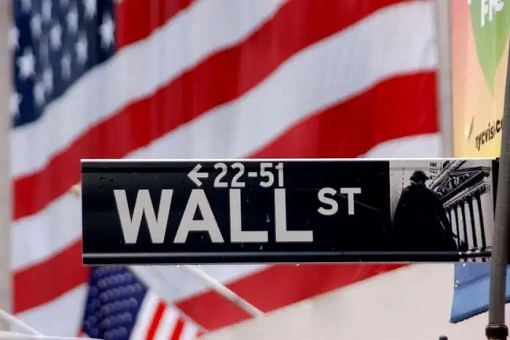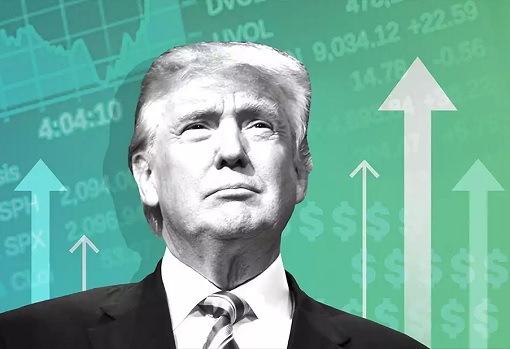The last time the DJIA (Dow Jones Industrial Average) posted a drop of more than 600 points was June 24, 2016, the day after the Brexit vote. So when the U.S. stocks dropped 665.75 points on Friday, there were tons of panicked faces. But generally people were quite calm as if the devilish 666-point plunge wasn’t a big deal at all.
In actuality, the Friday’s crash is a big deal. The more than 600 points crash was only the 9th time that has happened in the history of the United States’ stock market. But in terms of points, the 666 points plunge was the 6th worst ever in the history. Eight out of 9 times the Dow plunged more than 600 points occurred between the year 2000 and 2016.
Here’re the historical DJIA drops of more than 600 points:
- April 14, 2000 (Friday): drops 617.77 (-5.66%)
- September 17, 2001 (Monday): drops 684.81 (-7.13%)
- September 29, 2008 (Monday): drops 777.68 (-6.98%)
- October 9, 2008 (Thursday): drops 678.91 (-7.33%)
- October 15, 2008 (Wednesday): drops 733.08 (-7.87%)
- December 1, 2008 (Monday): drops 679.95 (-7.7%)
- August 8, 2011 (Monday): drops 634.76 (-5.5%)
- June 24, 2016 (Friday): drops 610.32 (-3.39%)

Friday’s 665.75 points drop, even though is significant and obviously very rare, is not harmful, at least not yet. That’s because in terms of percentage, it only represents 2.54%, thanks to DJIA which has soared over its 122-year history. Even at its closing of 25,520.96 points, the Dow saw a handsome gain as compared to the last time when it dropped more than 600 points.
The last time the DJIA plunged more than 600 points on June 24, 2016 (the day after Brexit); the Dow’s closing was 17,400.75. Since then (less than 2 years) the Dow has increased close to 10,000 points today. The S&P 500 and NASDAQ fell 59.85 and 144.92 points, or 2.12% and 1.96% respectively on Friday. Clearly, nobody cares about the drops simply because it’s quite negligible.
The Dow’s biggest drop in points in a single day was 777.68 on September 29, 2008, in the midst of the global financial crisis which was triggered by the U.S. subprime mortgage crisis. That 6.98% plunge 10 years ago would translate to just 3% drops today. Therefore, in terms of percentage, the drops on Friday were not really that scary.

More importantly, people have been anticipating a correction since last year. In fact, people have been told of stories or warnings that a 10% drop was not only overdue, but normal and just a matter of time. Now that finally a correction appears to be here, people were more relief than afraid about a deadly crash which could lead to recession or even depression.
At 2.54%, the 666 points tumble wasn’t even close to the record, a 22.6% collapse on Black Monday in 1987. Economists, analysts, experts and investment bankers have brainwashed investors for months not to panic but embrace a correction as if it’s a once in a lifetime opportunity to buy more stocks as they become cheaper.
The experts say such healthy correction should not only be welcomed, it’s merely a blip and not a crash. Even if people are too afraid to buy more stocks, they should at least wait and see, but don’t sell as the shares would rebound fairly quickly. People should start worrying only when the Dow tumbles 10% or 2,600 points, argued the so-called specialists.

However, investors should take note that the Dow Jones, S&P 500 and NASDAQ have posted their biggest weekly losses since early 2016. In other words, the Dow has actually lost 1,096 points this week. If there’s one silver bullet which could kill the present bull market instantly, it’s none other than interest rates. While experts are still bullish about the stock market, they aren’t sure about the interest rates.
The 666 points plunge on Friday was primarily due to a stronger than expected job report released by the Bureau of Labour Statistics. President Trump has done such an excellent job that the U.S. economy added 200,000 jobs in January, when estimation by economists was only 180,000. The report sent interest rates higher, with 10-year yield rose to 2.85% – hitting a 4-year high.
Now the bond market has literally gone bonkers, with a possibility of the Federal Reserve increasing rates 4 times this year, instead of 3 as initially forecasted. An inverted yield, which eventually predicted the 2008 recession, could be coming. After all, the 10-year-cycle of the last 2008 recession is due this year. Perhaps the 666 points drop is the beginning of a really nasty correction, if not a recession.

But really, for the time being, very few are worried about a recession. The idea of a recession is simply unthinkable at this moment. They trust Donald Trump would do everything in his power to ensure the gravy train doesn’t stop. Investors also took comfort that since the 666 points plunge didn’t trigger the circuit breaker, it couldn’t be that bad.
Other Articles That May Interest You …
- Goldman Sachs – Party Is Over, Stock Market Correction Coming In Months
- Get Ready For A Currency War – Trump Wants To Make American Dollar Weak Again
- Tariffs On Solar & Washing Machines – Why Trump’s Trade War Is Smart & Dumb
- Something Is Very Wrong!! – World’s Richest 1% Grab 82% Of Global’s Wealth
- Apple’s $350 Billion Investment Plan Proves Trump Is A Business Genius
- U.S. Household Debt Hits Record $12.84 Trillion – China Top Owner Of I.O.U. Papers
- US$1.021 Trillion – Americans’ Credit Card Debt Hits History High
- Here’s Why You Should Get Out Of Stock Market Now – Before The Volcano Erupts!

|
|
February 4th, 2018 by financetwitter
|


|

|

|

|

|

|




























Comments
Add your comment now.
Leave a Reply